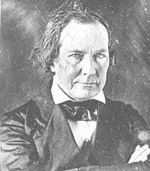Republic of Texas presidential election, 1838
|
|
|||||||||||||||||
|---|---|---|---|---|---|---|---|---|---|---|---|---|---|---|---|---|---|
|
|||||||||||||||||
|
|||||||||||||||||
|
|||||||||||||||||
The Republic of Texas presidential election of 1838 was the second presidential election. It was held on September 3, 1838. By a provision of the constitution, the term of office of the first president was limited to two years, without his being eligible for re-election; succeeding presidents were to hold their office for three years.
The contest was held between Mirabeau Lamar, the vice president of the Republic of Texas and Robert Wilson, the Republic of Texas Senator for Harrisburg and Liberty. Although both candidates were considered nonpartisan, the two were representative of competing factions. Because Texas law did not allow consecutive terms for presidents, incumbent Sam Houston could not run for re-election during this time. Lamar was considered Houston's rival, and although such differences between Houston and Lamar were at the time considered mostly personal in nature, Wilson was considered to be running on behalf of Houston's oppositional faction.
Wilson was at a large disadvantage because he did not announce his candidacy until well after Lamar did, and only due to the fact that two other previous candidates Peter W. Grayson and James Collinsworth had committed suicide earlier in the campaign process. Because the likelihood of Wilson defeating Lamar was considered so improbable, many considered Lamar to be running unopposed.
On December 1, 1837, eleven of the fourteen members of the Texas Senate addressed Vice President Mirabeau Lamar in a letter in which they encouraged him to accept a nomination. Before he would respond to this letter, six days later he wrote to Thomas Jefferson Rusk to inquire what his intentions were. In his response, Rusk gave Lamar his support, and claimed he would not run against him. It was then in which Lamar gave an affirmative response to the senators that he would run for office.
...
Wikipedia

